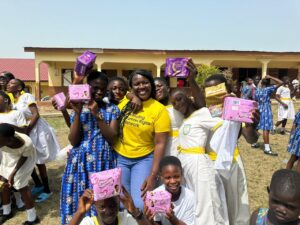
Every year on May 28, we observe International Menstrual Hygiene Day. This day serves as a reminder that menstruation should not be considered shameful; rather, it is a natural physiological occurrence that requires respect, proper education, and focused policies.
In Ghana, numerous teenage girls do not have access to reliable information regarding their menstrual cycles, affordable hygiene items, or secure locations to handle their periods. Consequently, this leads to various issues.
Embarrassment, quiet suffering, and lost chances. As reported by UNICEF, one out of every ten girls in Sub-Saharan Africa skips school while menstruating, which can jeopardize their educational advancement and personal confidence.
As someone who works as a midwife and runs the Nkansahs Foundation, I've had firsthand experience helping young females in both city and countryside areas who use dangerous substitutes like cloth pieces and paper due to their inability to buy sanitary napkins. Such practices expose them to potential infections and lasting problems related to reproductive health.
Thanks to programs such as the FlowClean Project, more than 230 girls have been taught how to create washable sanitary napkins, with over 50,000 disposable pads being handed out since 2018. However, these personal endeavors alone aren’t sufficient; what’s required now is comprehensive nationwide measures.
Menstrual health should be incorporated into public health strategies, educational programs, and community engagement initiatives.
Providing girls with education and secure resources is an affordable yet highly effective approach that can foster gender equality, enhance learning achievements, and support reproductive health.
On Menstrual Hygiene Day, let’s shatter the silence, confront the stigmas, and establish systems that enable each young woman to handle her menstruation with dignity rather than embarrassment.
When menstrual health takes center stage, every girl gets the opportunity to flourish.
Sarah works as a midwife and is an advocate for reproductive, maternal, child, and menstrual health and hygiene. Through her role as the host of 'Talk to Your Midwife,' she utilizes the power of radio to disseminate vital reproductive health knowledge.
Provided by Syndigate Media Inc. ( Syndigate.info ).
Post a Comment for "Ending Stigma, Promoting Period-Friendly Nations: A Global Conversation with Sarah Nkansa Boateng"